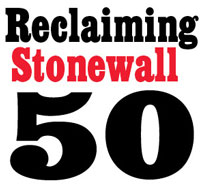 Fifty is a very impressive and deceptive number. We celebrate a half-century of struggle and progress since Stonewall—and, yet, at this same moment, we find ourselves in the midst of new waves of brutality, battered by revelations of spiritual and moral depravity in our own government and governments around the world. Our activists are under attack, our people are targeted for violence.
Fifty is a very impressive and deceptive number. We celebrate a half-century of struggle and progress since Stonewall—and, yet, at this same moment, we find ourselves in the midst of new waves of brutality, battered by revelations of spiritual and moral depravity in our own government and governments around the world. Our activists are under attack, our people are targeted for violence.
Still, there have been 50 years of progress, not linear, not unbroken, but real. Fifty years ago, in the pre-Stonewall days, the arguments against full acceptance of the humanity of gay people were based in psychiatry, law, and religion. We still hear the same rhetoric today, but we also see out and proud LGBTQ doctors, scholars, lawyers, judges, mayors, governors, senators, presidential candidates, artists, writers, performers, and religious leaders. We see our monuments and flags defaced and vandalized, but we also see them appearing more frequently, created by ourselves and our millions of allies.
We can count 50 years of progress and 50 years of setback in the same moment. We can celebrate the gains we have made against government oppression and, at the same time, watch the protections we have won be erased by our hate-fueled president as by a child with an Etch-a-Sketch. We can count 50 years of creating order out of chaos and yet the chaos still roils and churns.
As a rabbi, I understand that religion has been a weapon used in the most vicious homophobic ways. It has been—and, all too often, still is—used to declare us less than human and fit for slaughter, much as it has also been used to justify racism, slavery, misogyny, and patriarchy. The fingerprints of religion can be found all over some of the worst crimes of society.
But I believe religion is also a force for liberation, not only for oppression. Religion provides us the language of possibility and redemption. The universal truths we can derive from religion are substance from which we can build links to other movements and their struggles for liberation and fulfillment.
In Jewish mysticism, the creation of the physical world came at a moment when Divinity was compressed into vessels that simply couldn’t contain it. The vessels shattered, and the shards of the vessels with the Divine energy still clinging to them became the world we know.
Stonewall was a similar moment of explosion, when the shimmering energy of Queer identity became too intense to be held in any longer, and Queerness glitter-bombed the world.
We commemorate the courage of the young Queer people, the trans women, the drag queens, the boys, the dykes, the people of color, the white people who fought back on those nights in June 1969 and who exploded the closets that held us in. That courage, that outrage, that rage has kept us alive, guided us through the hell of the AIDS crisis, and allows us to be strong at this moment in time when forces of bigotry are seeking to contain us again.
Before Stonewall, it was too easy for the forces of oppression to do their dirty work in quiet. They intimidated us and shamed us into invisibility. The same forces are at work today, trying to stifle us with their homophobia, trying to keep people of color out of power and their lives in peril, trying to keep transfolk from claiming their names and identities, trying to keep immigrants and refugees penned up in cages and terrorized by ICE agents because they dare look for a better life. Stonewall was one of the recurring moments of revolution, though, when it was proved that the Divine Energy of which all of us were created cannot be contained. They can’t hold us back, because we know better now.
We commemorate the courage of our revolutionaries, and we celebrate the beauty of our own Divinity. In 1968, a year before the Stonewall uprising, Mart Crowley wrote a line of gay Torah (sacred text) in his play The Boys in the Band: “Oh, Mary, it takes a fairy to make something pretty.” All right, perhaps we hadn’t totally cornered the market on fabulousness, but we were artists and creators who had crafted a culture for ourselves within the strictures of our oppression. We had shaped complex identities that in turn passed for straight, mocked straightness, or just shed the dull husk of straightness and emerged in butch power or queeny radiance. Queer people are artists, and Queer lives are art. As artists, we have whole new worlds to create. Marriage equality and permission to serve in the military were never the final goals of our struggle; liberation has always meant more than that.
Gay, Jewish, American musical genius Leonard Bernstein once said, “This will be our reply to violence: to make music more intensely, more beautifully, more devotedly than ever before.” In Stonewall commemorations, we find our fabulousness that was always there, and we turn up the intensity, crank up the volume, put on a little more lipstick or leather. Or maybe we just step out into the street holding hands with our lovers and spouses, our children, our parents, our chosen families, our friends.
Jewish tradition teaches that extraordinary moments in life are to be met with blessings. Fifty years since Stonewall is an extraordinary moment, a moment of joy and a time to be awake to on-going tragedy and heartbreak.
Bless the glittering God of Stonewall, who gave us heroes then and now, who created us in Her fabulous image, and rejoices in our liberation.


